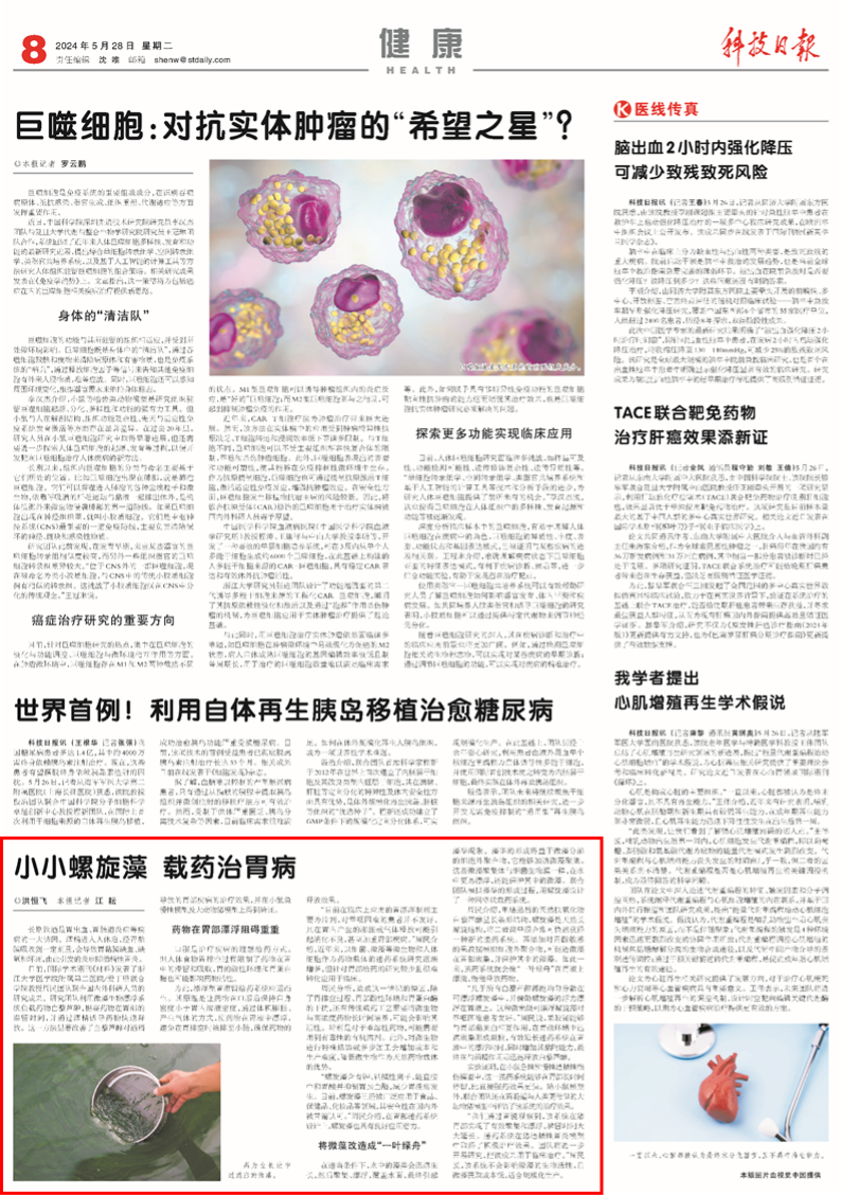Professor Zhou Min's team from the Second Affiliated Hospital of Zhejiang University and Zhejiang University-University of Edinburgh Institute has been at the forefront of addressing safety challenges in drug delivery systems. They innovatively leverage edible, active microalgae as drug carriers, leading to the development of highly safe and clinically promising oral medications. Recently, their latest research was published in the international academic journal Matter, highlighting their use of spirulina to improve drug retention in the stomach and effectively treat alcohol-induced gastric injuries in both mice and large animal models. This breakthrough has garnered widespread attention and coverage from mainstream media.In recent days, Science and Technology Daily featured a special report on the latest achievements of Professor Zhou Min's team.

Spirulina for Gastric Disease Treatment
Long-term alcohol consumption is a major cause of gastric bleeding and gastrointestinal inflammation. Alcohol absorbed through the gastric mucosa can lead to ischemia, hypoxia, and necrosis, causing alcoholic gastritis. The recent study by Professor Zhou’s team, published in Matter, demonstrated how a microalgae-based floating drug delivery system can improve the retention time of resveratrol in the stomach, and induce rapid drug release through alcohol, significantly enhancing its therapeutic effect on alcohol-induced gastric diseases. This method was also validated in both acute and chronic mouse models and large animal pig models.
Challenges in Gastric Floating Drug Delivery
Oral administration is ideal for disease treatment, but the gastric emptying process limits drug retention and absorption in the stomach. The acidic environment and gastric enzymes can also affect drug activity. Therefore, floating gastric retention systems have been developed to address these issues. These systems maintain the drug density lower than the density of the gastric fluid, keeping the drug afloat in the stomach through mechanisms such as volume expansion and gas generation, thereby preventing it from being prematurely expelled into the intestines to ensure effective drug release.Additionally, special modifications or multi-step processing of microorganisms increase costs and production complexity, reducing the advantages of using microorganisms as natural drug carriers.
“Current clinical floating formulations, mainly tablets, are not suitable for patients with swallowing difficulties and may cause indigestion or even exacerbate gastric issues.” Prof. Zhou explains that using microorganisms like bacteria and microalgae as drug carriers is an emerging field. However, research specifically on gastric drug delivery has been limited. He analyzes that the challenges include not only the gastric emptying process, the acidic environment, and interference from gastric enzymes, but also the long-term traditional drug-loading processes that may affect microbial activity. Especially for some poorly soluble drugs, toxic organic solvents may be needed.
“By contrast, Spirulina, rich in potassium and sodium ions, can neutralize stomach acid and inhibit pepsin, reducing ulcer formation. They have already been widely used in food, supplements, and cosmetics. Spirulina’s safety is well-recognized globally, making it a promising candidate for gastric drug delivery.” Prof. Zhou introduced.
Transforming Microalgae into a “Green Raft” for Drug Delivery
Microalgae can rapidly grow and form blooms in water under suitable conditions, which are facilitated by extracellular polymers that accelerate aggregation. These aggregates, similar to bacterial biofilms, can float more easily in water and protect the microalgae inside. Prof. Zhou’s research team mimicked this natural process to design a spirulina-based mesh drug delivery system. As explained by Prof. Zhou, recrystallized natural antioxidant resveratrol forms a rod-like structure, while spirulina has a natural helical structure. By simply combining the two, a new drug delivery system can be quickly created. Then, adding pectin bismuth, which is sensitive to stomach acid and simulates extracellular polymers, further helps microalgae aggregation and protection. Hence, this system floats on gastric fluid like a "green boat", slowly releasing the drug.
"Almost all of the resveratrol can be evenly dispersed within the floating spirulina, which then floats on the gastric fluid due to the buoyancy of the spirulina. This micron-sized floating spirulina is user-friendly for patients with swallowing difficulties," said Zhou Min. "Pectin bismuth can interact with gastric mucin, rapidly forming a gel in the acidic environment of the stomach. This effectively prolongs the floating time of the drug delivery system in the gastric fluid and increases its adhesion capability, ultimately allowing for the rapid release of resveratrol upon interaction with alcohol."
Experimental results showed that the floating spirulina system effectively prolonged drug retention in the stomach and enhanced therapeutic effects in mouse models of alcohol-induced gastric injury compared with direct administration. The system also demonstrated significant efficacy in large animal pig models that closely resemble human gastrointestinal conditions. Gastroscopy confirmed the system’s effective aggregation and floating in the pig stomach, with extended retention time and positive therapeutic outcomes. Prof. Zhou’s research team is further exploring methods to apply these findings to clinical treatments. “This system does not affect the bioactivity of the microalgae, and the low cost of acquiring microalgae makes it suitable for large-scale production,” said Prof. Zhou.
Media Background
Science and Technology Daily is a central mainstream media outlet approved by the Central Office and managed by the Ministry of Science and Technology. It is a vice-ministerial level institution responsible for the Communist Party of China and the state's propaganda tasks. It serves as an important opinion leader in the field of science and technology, a platform for readers to leverage technology to create wealth, enhance civilization, and improve living standards, and a bright window through which China's scientific community connects with society and the world.







